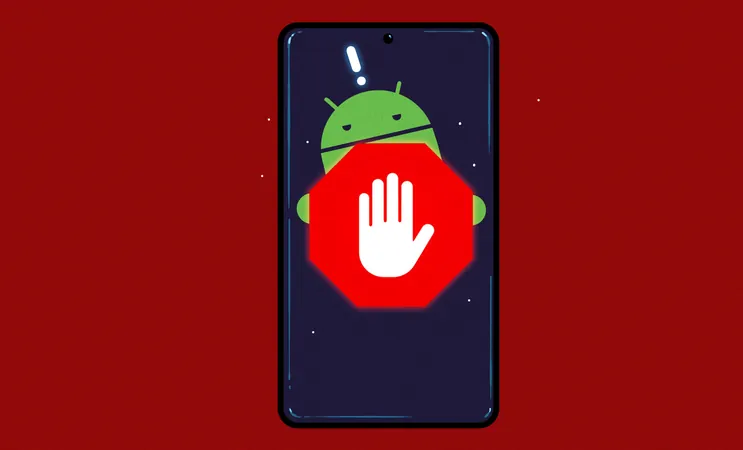
Google's New Play: Are They Turning Android Into a Closed Garden?
2025-08-28
Author: Kai
The Latest Move: Sideloading Under Fire
In a shocking twist, Google is gearing up to tighten its grip on Android by targeting 'sideloaded' applications—those installed from outside the official app store. This move has sparked outrage from users who cherish Android's open nature, a key reason many chose the platform over its more restrictive rivals. As Google veers toward a more closed ecosystem, the future of beloved services like the F-Droid repository hangs in the balance.
From Champion to Gatekeeper
Those monitoring Google's trajectory won't find this shift surprising. Once a beacon of hope in the tech landscape, Google aimed to keep rivals at bay with an open-source browser engine. Fast forward, and they now dominate a staggering 72% of the mobile OS market, setting sights on controlling which apps you can install on your device. The pressing question remains: will users challenge this encroachment?
The New Sidesteps of Sideloading
Currently, Android users are encouraged to download apps exclusively from Google Play or their manufacturer’s app store. Other sources are labeled untrusted by default. While critics argue that Google isn’t outright banning sideloading, the reality is they are introducing a strict verification system. Apps can now only be sideloaded from verified developers, a stark shift that signals a worrisome trend.
A Security Facade?
In their defense, Google claims this verification is purely for security, comparing it to airport ID checks. However, skeptics will note the inherent conflict; those verifying identity could very well hold the power to scrutinize the apps themselves. Will Google resist the urge to limit access for any developers they wish to sideline?
The Bigger Picture: OSS Rebuild
This isn't an isolated initiative. Google is also pushing its OSS Rebuild program, which aims to shield users from supply chain attacks by verifying open-source libraries. At first glance, this seems beneficial. Yet, the underlying issue is about who gets to decide what constitutes a 'trusted' developer. If Google carries the authority to bless or ban developers at will, the landscape of open-source software could be dramatically altered.
Controlling the Narrative
As Google expands its oversight, developers may find themselves facing the kind of arbitrary treatment that has plagued other platforms like YouTube. If Google decides to exclude certain developers from verification, they could easily stifle innovation. Will the open-source realm bow to Google’s whims?
The Winds of Change
Google is notoriously unpredictable, often scrapping initiatives that no longer serve its interests. This might just be another case where user backlash can influence corporate policy. With the official roll-out of verified sideloading scheduled for 2027, there's plenty of time for community response to shape Google's final approach.
A Beacon of Hope?
On a more positive note, Google has hinted at allowing students and hobbyists the freedom to develop and install their own apps, potentially softening the impact of these new restrictions. Depending on the specifics, this could leave room for user creativity to flourish.
Stand United Against Monopoly
Regardless of the outcome, it’s crucial for the community to voice concerns and resist this growing centralization. Google may be a giant, but together, users and developers can push back and demand a truly open Android ecosystem.


 Brasil (PT)
Brasil (PT)
 Canada (EN)
Canada (EN)
 Chile (ES)
Chile (ES)
 Česko (CS)
Česko (CS)
 대한민국 (KO)
대한민국 (KO)
 España (ES)
España (ES)
 France (FR)
France (FR)
 Hong Kong (EN)
Hong Kong (EN)
 Italia (IT)
Italia (IT)
 日本 (JA)
日本 (JA)
 Magyarország (HU)
Magyarország (HU)
 Norge (NO)
Norge (NO)
 Polska (PL)
Polska (PL)
 Schweiz (DE)
Schweiz (DE)
 Singapore (EN)
Singapore (EN)
 Sverige (SV)
Sverige (SV)
 Suomi (FI)
Suomi (FI)
 Türkiye (TR)
Türkiye (TR)
 الإمارات العربية المتحدة (AR)
الإمارات العربية المتحدة (AR)